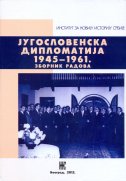Вељко Мићуновић – два различита искуства из дипломатских службовања у Москви
Veljko Mićunović - Two Diverging Experiences From Diplomatic Service in Moscow
Author(s): Đoko Tripković
Subject(s): Diplomatic history, Political history, International relations/trade, Post-War period (1950 - 1989)
Published by: Institut za noviju istoriju Srbije
Keywords: Veljko Mićunović; Ambassador; Moscow; Tito; Khrushchev; Brežnjev; relations; Yugoslavia; USSR;
Summary/Abstract: The prominent political functionary of Tito’s Yugoslavia, Veljko Mićunović, changed into diplomatic service in early 1950s, where he would remain for the next twenty-odd years. Apart from serving on high posts in the Ministry of Foreign Affairs and in the Federal Parliament, for more than 20 years he was also on the most prominent diplomatic positions abroad as ambassador to the USSR and the USA. He served in Moscow two times: 1956-1958 and 1969-1971, and in Washington between 1962 and 1967. He represented with decision and successfully the foreign political orientation of Josip Broz Tito and the Yugoslav government and worked actively to improve the bilateral cooperation with two leading powers of the time of which the international position of Yugoslavia mostly depended. Mićunović’s experiences from serving in Moscow were clearly different, although on both occasions he was appointed ambassador at the time Yugoslav-Soviet relations were improving: for the first time after reconciliation after the several years long conflict that started in 1948 and for the second after a severe cooling down that lasted for a year due to the events in Czechoslovakia. On the first occasion Mićunović established very good communication and even friendly relations with Nikita Khrushchev and many other persons from the top of the State and Party establishment. Basically he managed to retain that position until the end of his tenn in Moscow, despite the significant deterioration of the bilateral relations due to the events in Hungary, and the deepening of the ideological gap because of the adoption of the new Program of the Union of the Communists of Yugoslavia. This circumstance enabled him to send to Belgrade and to Tito in person first hand information that certainly were important element for determining the political course regarding the USSR. However, during his second tenn Mićunović didn’t manage to build up such relations. The Soviet leader Leonid Brezhnev received him only fifteen months after his arrival in Moscow, this being, together with the farewell visit couple of months later, the only opportunity to talk to him. He also met Kosygin, Gromyko and other high officials several times, but this was still much less than his first stay in Moscow, and probably less than Mićunović had expected. As the main reasons for such treatment he adduces the fact that the ruling set didn’t forget his friendly relations with Khrushchev and his public speeches in which he condemned the intervention in Czechoslovakia. One should add that political circumstances, both international and bilateral, as well as the operating style of the Brezhnev leadership in the early 1970s, were substantially different then those of the times of his first term of office in Moscow.
Book: Југословенска дипломатија 1945-1961.
- Page Range: 242-255
- Page Count: 14
- Publication Year: 2012
- Language: Serbian
- Content File-PDF

